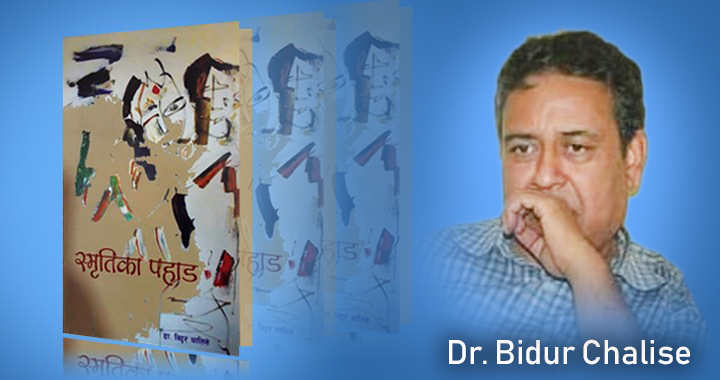
By AK Vanprasthi
16 August 2018, Kathmandu
A new anthology of Nepali language poems, Smritika Pahad, penned by Dr. Bidur Chalise has hit the market. The anthology’s Nepali language title can be translated as the mountain of memories.
Published by Samakalin Sahitya Pratishthan (Samakalin Literary Academy), the United Kingdom, the anthology consists of ninety-six poems. The book carries a hefty price tag of Rs. 300/-. Bhundipuran Prakashan of Kathmandu is the main distributor of the book in Nepal.
Presently an Associate Professor of Nepali at Padma Kanya Multiple Campus of Tribhuvan University, Dr. Chalise embarked upon writing career in the late 1970s. Among the primary influences on his poetic career, Dr. Chalisey names “revolutionary” poet Gopal Prasad Rimal, free verse poet Bhupi Sherchan, and Laxmi Prasad Devkota, especially his romanticism.
This anthology is his ninth book. Earlier, he has published books which includes varied subjects like research on Nepali grammar, short epic, and several anthologies of poems. Talking to Pariwartankhabar, he informed that for over two years now he has been composing poems on daily basis.
Dr. Chalise regards the period of over 25 years starting from 2035 B.S. to 2060s B.S. as his “initial years”. During this period, he was imbued with leftist ideals and therefore was a “progressive” writer and poet. Gradually Dr. Chalise shifted to an outpouring of his poetic sensibilities on subjects like nature, love and life, and their intermingling.
Apart from poetry, Dr. Chalise has been a researcher on various stages and historical evolution of Nepali language and grammar.
Both Rimal and Sherchan rejected meter. In line with their influence which Dr. Chalise imbibed early on in life, he writes “prose poetry”. However, he does apply and fuse several poetic techniques to embellish his poetry. Dr. Chalise’s anthology reveals his rich vocabulory. He also extensively uses imagery, which betrays his soft poetic side.
Dr. Chalise is a thinker who delves deep into diverse and stark issues in life. He also finds commonality with many of the questions about life that were posited by 19th and 20th century European Existentialist philosophers. Therefore, the poems in the anthology deal with varied topics.
Themes of many of the poems are “existentialist” in nature. Dr. Chalise’s poetic sensibility finds itself struggling to give expression to his inner confrontation with the ultimate and utter meaninglessness of human life.










